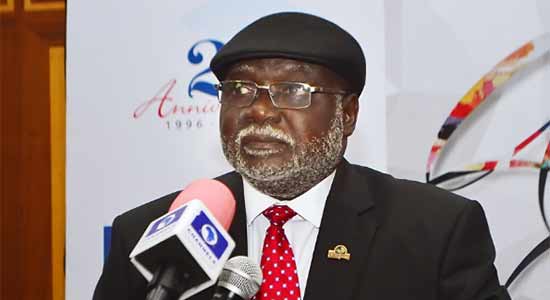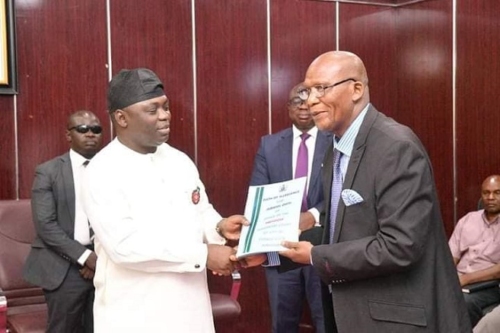JUDICIARY NEWS 20/12/2021
CCT Can’t Justify N400 Million Paid To Contractors — Audit Report

The Code of Conduct Tribunal (CCT) paid over N400 million to contractors for various projects in 2019, but cannot provide any documents to justify the expenditures, a new report by the Office of the Auditor-General of the Federation (OAuGF) has said.
Basic documents such as payment vouchers could not be provided by the CCT and the level of work done for which the payments were made could also not be ascertained during audit exercise, the report stated, raising concerns about likely “diversion of the funds or payment for work not done”.
The audit report, the latest in the OAuGF’s annual series, is titled, ‘Non-compliance/Internal Control Weakness Issues in Ministries, Departments and Agencies of the Federal Government of Nigeria for the Year ended December 31, 2019’.
It was recently submitted by the AuGF, Adolphus Aghughu, to the Clerk to the National Assembly in compliance with the provisions of section 85(2) and (4) of the Nigerian constitution.
The CCT projects for which a total of N434.5 million was said to have been paid were said to be located in Cross River, Bauchi, Kaduna, and Enugu States, but their particulars were not disclosed in the OAuGF report.
”The sum of 434,500,000.00 (Four hundred and thirty-four million, five hundred thousand naira) was paid to contractors for projects in Calabar, Kaduna, Bauchi and Enugu.
“There was no documentary evidence on the progress of work like Bill of Engineering Measurement and Evaluation (BEME), Consultants Interim Payment Certificate (IPC) and payment vouchers in respect of the payments, and,
“The level of work done for which payments were made could not be ascertained due to the refusal of the Tribunal to lead the auditors on inspection of project sites,” the 2019 Audit Report stated.
An official of the CCT told Premium Times the issue ”has since been resolved”.
Regulation breach, risks
The OAuGF also said in the report that the “anomalies” could be attributed to “weaknesses in the internal control system” at the CCT, a constitutional body set up to adjudicate on cases of alleged breaches of the code of conduct by public officers.
The development is a violation of paragraph 603(I) of the Financial Regulations, the report indicated.
“All vouchers shall contain full particulars of each service, such as dates, numbers, quantities, distances and rates, so as to enable them to be checked without reference to any other documents and will invariably be supported by relevant documents such as local purchase orders, invoices, special letters of authority, time sheets. Etc,” the report quoted the provision as stating.
The inherent risks in the anomalies of the likely breach of the regulation, according to the report are, “diversion of public funds and payment for work not done.”
CCT management’s response
CCT management, according to the report, had in response to the query over the payments, said the documents in questions could not be made available as a result of official absence of the Tenders Board’s Secretary who was said to be bereaved at the time of audit exercise.
Recommendations
The report, among other recommendations, said the Chief Registrar of the CCT should be made to “furnish reasons why payments for capital projects were made without supporting documents as required by extant regulations.”
It added that the Chief Registrar should be made to provide “the Original Payment Vouchers with relevant documents like Letter of Award of Contracts, Bill of Engineering Measurement and Evaluation (BEME), Consultants Interim Payment Certificate (IPC) in respect of work done in Calabar, Kaduna, Bauchi and Enugu”.
It also recommended the recovery of the total N434,500,000 from the contractors and the remittance of same to the treasury.
The Chief Registrar, in the audit report recommendations, should forward evidence of remittance to the Public Accounts Committees of the National Assembly, 2019 Annual Report.
”Otherwise, apply sanctions relating to irregular payment and gross misconduct specified in paragraphs 3106 and 3129 of the Financial Regulations respectively.”
CCT Chief Registrar speaks
But when contacted on Saturday, the Chief Registrar of CCT, Abdulmalik Shuaibu, told PREMIUM TIMES the “issue has since been sorted out”.
He said, as stated in the report, that the CCT official in possession of the relevant documents, was not available when the audit team visited the tribunal sometimes last year.
“We later gathered all relevant documents and submitted to the audit team, but they told us that the report had already reached an advance stage at the time,” he said.
Although the nature of the projects was not stated in the report, Mr Shuaibu said “they are court halls for the various geo-political zones”.
He said, the CCT, which from time operated, only its office complex with one court hall in Abuja, came up with the idea of constructing court halls in the six geo-political zones of the country, due to difficulties of securing space to conduct proceedings during the regional sittings of the three-man tribunal.
He explained that the tribunal run by two members and its chairperson, Danladi Umar, holds the regional sittings to ease the problems of defendants who may not be able to afford to travel to Abuja for their trials
“Staff had even moved into the buildings in the various geo-political zones. And apart from the court halls in the various geo-political zones, the tribunal has offices in 12 states,” Mr Shuaibu added.



